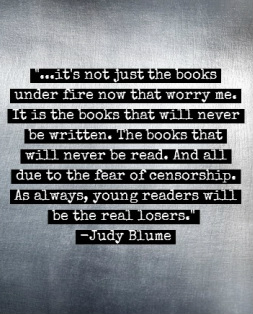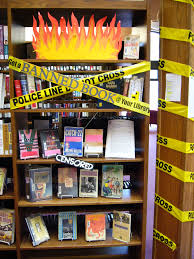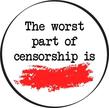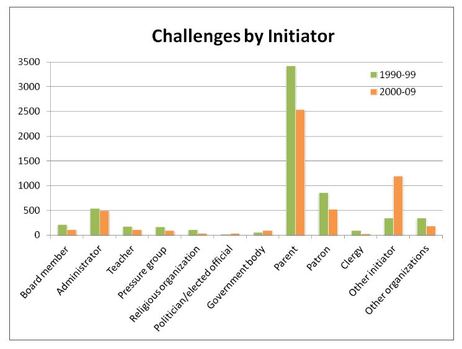What is a challenge vs. banning a book?
While challenging a book is an attempt to remove or restrict materials, banning is the actual removal of the material. Challenging a book is not simply expressing one's opinion about it. The person who challenges a book wants to completely restrict access to it by removing it from the curriculum or library. Because of the efforts of librarians, teachers, parents and students, challenges are often unsuccessful. Most books remain in the school curriculum or library collection.
|
|
This video provides examples for some literary masterpieces that have been banned. The narrator explains why they have been banned, and why banning books may actually give them more positive attention. |
Reasons why books are challenged & Banned

The challenger has a specific mission--to protect others from difficult information and ideas, inappropriate content and language. Often times, the goal is to protect children in schools. Here are the top three reasons materials are challenged according to the Office of Intellectual Freedom:
1. The material was considered to be "sexually explicit."
2. The material contained "offensive language."
3. The material was "unsuited to any age group."
1. The material was considered to be "sexually explicit."
2. The material contained "offensive language."
3. The material was "unsuited to any age group."
Who challenges books?
Many different groups and types of people from all different beliefs, races, and religions have challenged books and other materials. Parents are by far the most popular category for initiators of challenging books. The chart below, which was taken from the American Library Association's web site about banned books, shows Challenges by Initiator for the years 1990-99 and 2000-09.
a history of banned books week

According to the Banned Books Week website, Banned Books week began in 1982 in response to the number of books being challenged at that time. More than 11,000 books have been challenged since 1982, including many works considered classics. Some of these that are commonly challenged are The Catcher in the Rye, the Great Gatsby, the Grapes of Wrath, of Mice and Men, and The Adventures of Huckleberry Finn. Recent challenges have included the Harry Potter and Twilight Series and titles such as the Absolutely True Diary of a Part-Time Indian.
To see a list of the top banned books, please click on the following link:
http://www.ala.org/bbooks/frequentlychallengedbooks/classics
Banned Books week will take place on September 21-27, 2014.
To see a list of the top banned books, please click on the following link:
http://www.ala.org/bbooks/frequentlychallengedbooks/classics
Banned Books week will take place on September 21-27, 2014.
Censorship in Schools

censorship |ˈsensərˌSHip| (noun) - the practice of officially examining books, movies, etc., and suppressing unacceptable parts
Censorship in schools, especially in libraries, limits access to information for students, teachers, and other users. Censors attempt to remove controversial reading material from the school setting so that children cannot be exposed to these issues. Censorship is a dangerous practice that can lead to lack of materials and limited information.
The National Coalition Against Censorship offers the following advice for librarians, teachers, and school officials when dealing with attempts at censorship:
Be prepared. Teachers and educators should be familiar with the school’s policies and procedures for dealing with book challenges and should be prepared to follow the procedures. (For the essential elements of a model complaint policy, see below.)
Convey key messages about school curricula. If responding to a challenge, focus on three key points:
The National Coalition Against Censorship offers the following advice for librarians, teachers, and school officials when dealing with attempts at censorship:
Be prepared. Teachers and educators should be familiar with the school’s policies and procedures for dealing with book challenges and should be prepared to follow the procedures. (For the essential elements of a model complaint policy, see below.)
Convey key messages about school curricula. If responding to a challenge, focus on three key points:
- School curricula reflect a spectrum of social and political views and experiences.
- School curricula are chosen by professional educators familiar with students’ educational needs and abilities.
- In many cases, parents’ concerns can be addressed by requesting an alternative assignment.
- Encourage parents to raise any concerns they may have about their children’s education.
- Explain the three key points listed above.
- Be prepared to articulate the educational rationale for reading the book in question.
- Be prepared to discuss the school’s policies and procedures for challenging books, and provide forms or written instructions, if available.

